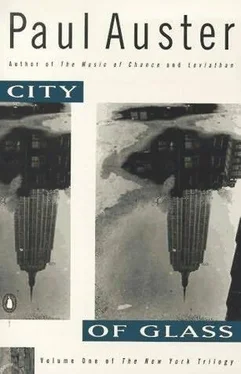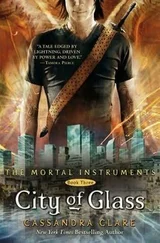Paul Auster - City of Glass
Здесь есть возможность читать онлайн «Paul Auster - City of Glass» весь текст электронной книги совершенно бесплатно (целиком полную версию без сокращений). В некоторых случаях можно слушать аудио, скачать через торрент в формате fb2 и присутствует краткое содержание. Жанр: Современная проза, на английском языке. Описание произведения, (предисловие) а так же отзывы посетителей доступны на портале библиотеки ЛибКат.
- Название:City of Glass
- Автор:
- Жанр:
- Год:неизвестен
- ISBN:нет данных
- Рейтинг книги:5 / 5. Голосов: 1
-
Избранное:Добавить в избранное
- Отзывы:
-
Ваша оценка:
- 100
- 1
- 2
- 3
- 4
- 5
City of Glass: краткое содержание, описание и аннотация
Предлагаем к чтению аннотацию, описание, краткое содержание или предисловие (зависит от того, что написал сам автор книги «City of Glass»). Если вы не нашли необходимую информацию о книге — напишите в комментариях, мы постараемся отыскать её.
City of Glass — читать онлайн бесплатно полную книгу (весь текст) целиком
Ниже представлен текст книги, разбитый по страницам. Система сохранения места последней прочитанной страницы, позволяет с удобством читать онлайн бесплатно книгу «City of Glass», без необходимости каждый раз заново искать на чём Вы остановились. Поставьте закладку, и сможете в любой момент перейти на страницу, на которой закончили чтение.
Интервал:
Закладка:
For the first time since he had bought the red notebook, what he wrote that day had nothing to do with the Stillman case. Rather, he concentrated on the things he had seen while walking.
He did not stop to think about what he was doing, nor did he analyze the possible implications of this uncustomary act. He felt an urge to record certain facts, and he wanted to put them down on paper before he forgot them.
Today, as never before: the tramps, the down-and-outs, the shopping-bag ladies, the drifters and drunks. They range from the merely destitute to the wretchedly broken. Wherever you turn, they are there, in good neighborhoods and bad.
Some beg with a semblance of pride. Give me this money, they seem to say, and soon I will be back there with the rest of you, rushing back and forth on my daily rounds. Others have given up hope of ever leaving their tramphood. They lie there sprawled out on the sidewalk with their hat, or cup, or box, not even bothering to look up at the passerby, too defeated even to thank the ones who drop a coin beside them. Still others try to work for the money they are given: the blind pencil sellers, the winos who wash the windshield of your car. Some tell stories, usually tragic accounts of their own lives, as if to give their benefactors something for their kindness-even if only words.
Others have real talents. The old black man today, for example, who tap-danced while juggling cigarettes-still dignified, clearly once a vaudevillian, dressed in a purple suit with a green shirt and a yellow tie, his mouth fixed in a half-remembered stage smile. There are also the pavement chalk artists and musicians: saxophonists, electric guitarists, fiddlers. Occasionally, you will even come across a genius, as I did today:
A clarinetist of no particular age, wearing a hat that obscured his face, and sitting cross-legged on the sidewalk, in the manner of a snake-charmer. Directly in front of him were two wind-up monkeys, one with a tambourine and the other with a drum. With the one shaking and the other banging, beating out a weird and precise syncopation, the man would improvise endless tiny variations on his instrument, his body swaying stiffly back and forth, energetically miming the, monkeys' rhythm. He played jauntily and with flair, crisp and looping figures in the minor mode, as if glad to be there with his mechanical friends, enclosed in the universe he had created, never once looking up. It went on and on, always finally the same, and yet the longer I listened the harder I found it to leave.
To be inside that music, to be drawn into the circle of its repetitions: perhaps that is a place where one could finally disappear.
But beggars and performers make up only a small part of the vagabond population. They are the aristocracy, the elite of the fallen. Far more numerous are those with nothing to do, with nowhere to go. Many are drunks but that term does not do justice to the devastation they embody. Hulks of despair, clothed in rags, their faces bruised and bleeding, they shuffle through the streets as though in chains. Asleep in doorways, staggering insanely through traffic, collapsing on sidewalks-they seem to be everywhere the moment you look for them. Some will starve to death, others will die of exposure, still others will be beaten or burned or tortured.
For every soul lost in this particular hell, there are several others locked inside madness-unable to exit to the world that stands at the threshold of their bodies. Even though they seem to be there, they cannot be counted as present. The man, for example, who goes everywhere with a set of drumsticks, pounding the pavement with them in a reckless, nonsensical rhythm, stooped over awkwardly as he advances along the street, beating and beating away at the cement. Perhaps he thinks he is doing important work. Perhaps, if he did not do what he did, the city would fall apart. Perhaps the moon would spin out of its orbit and come crashing into the earth. There are the ones who talk to themselves, who mutter, who scream, who curse, who groan, who tell themselves stories as if to someone else. The man I saw today, sitting like a heap of garbage in front of Grand Central Station, the crowds rushing past him, saying in a loud, panic-stricken voice: "Third Marines… Eating bees… The bees crawling out of my mouth." Or the woman shouting at an invisible companion: "And what if I don't want to! What if I just fucking don't want to!"
There are the women with their shopping bags and the men with their cardboard boxes, hauling their possessions from one place to the next, forever on the move, as if it mattered where they were. There is the man wrapped in the American flag. There is the woman with a Halloween mask on her face. There is the man in a ravaged overcoat, his shoes wrapped in rags, carrying a perfectly pressed white shirt on a hanger-still sheathed in the dry-cleaner's plastic. There is the man in a business suit with bare feet and a football helmet on his head. There is the woman whose clothes are covered from head to toe with Presidential campaign buttons. There is the man who walks with his face in his hands, weeping hysterically and saying over and over again: "No, no, no. He's dead. He's not dead. No, no, no. He's dead. He's not dead."
Baudelaire: Il me semble que je serais toujours bien là où je ne suis pas. In other words: It seems to me that I will always be happy in the place where I am not. Or, more bluntly: Wherever I am not is the place where I am myself. Or else, taking the bull by the horns: Anywhere out of the world.
It was almost evening. Quinn closed the red notebook and put the pen in his pocket. He wanted to think a little more about what he had written but found he could not. The air around him was soft, almost sweet, as though it no longer belonged to the city. He stood up from the bench, stretched his arms and legs, and walked to a phone booth, where he called Virginia Stillman. Then he went to dinner.
In the restaurant he realized that he had come to a decision about things. Without his even knowing it, the answer was already there for him, sitting fully formed in his head. The busy signal, he saw now, had not been arbitrary. It had been a sign, and it was telling him that he could not yet break his connection with the case, even if he wanted to. He had tried to contact Virginia Stillman in order to tell her that he was through, but the fates had not allowed it. Quinn paused to consider this. Was "fate" really the word he wanted to use? It seemed like such a ponderous and old-fashioned choice. And yet, as he probed more deeply into it, he discovered that was precisely what he meant to say. Or, if not precisely, it came closer than any other term he could think of. Fate in the sense of what was, of what happened to be. It was something like the word "it" in the phrase "it is raining" or "it is night." What that "it" referred to Quinn had never known. A generalized condition of things as they were, perhaps; the state of is-ness that was the ground on which the happenings of the world took place. He could not be any more definite than that. But perhaps he was not really searching for anything definite.
It was fate, then. Whatever he thought of it, however much he might want it to be different, there was nothing he could do about it. He had said yes to a proposition, and now he was powerless to undo that yes. That meant only one thing: he had to go through with it. There could not be two answers. It was either this or that. And so it was, whether he liked it or not.
The business about Auster was clearly a mistake. Perhaps there had once been a private detective in New York with that name. The husband of Peter's nurse was a retired policeman-therefore not a young man. In his day there had no doubt been an Auster with a good reputation, and he had naturally thought of him when called upon to provide a detective. He had looked in the telephone book, had found only one person with that name and assumed he had the right man. Then he gave the number to the Stillmans. At that point, the second mistake had occurred. There had been a foul-up in the lines, and somehow his number had got crossed with Auster's. That kind of thing happened every day. And so he had received the call-which anyway had been destined for the wrong man. It all made perfect sense.
Читать дальшеИнтервал:
Закладка:
Похожие книги на «City of Glass»
Представляем Вашему вниманию похожие книги на «City of Glass» списком для выбора. Мы отобрали схожую по названию и смыслу литературу в надежде предоставить читателям больше вариантов отыскать новые, интересные, ещё непрочитанные произведения.
Обсуждение, отзывы о книге «City of Glass» и просто собственные мнения читателей. Оставьте ваши комментарии, напишите, что Вы думаете о произведении, его смысле или главных героях. Укажите что конкретно понравилось, а что нет, и почему Вы так считаете.












